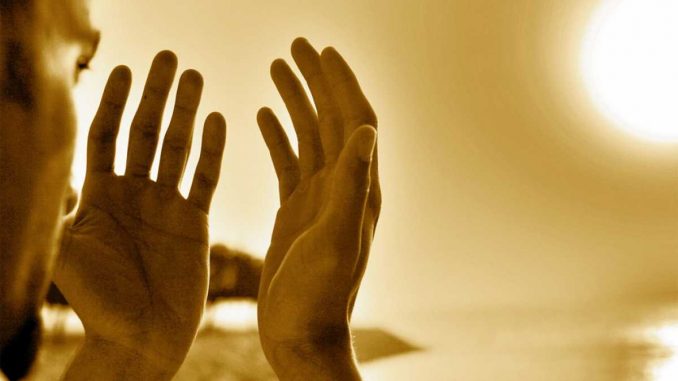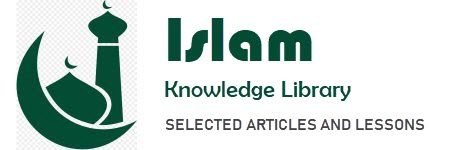
Volume 004 : Funerals and Dhikr. Fiqh 4.111B.
Section : Raising One’s hands to one’s shoulders..
Ibn ‘Abbas is reported as saying, “When asking for something from Allah, you should raise your hands opposite to your shoulders; when asking for forgiveness you should point with one finger; and when making an earnest supplication you should spread out both your hands.”
This is reported by Abu Daw’ud.
Malik b. Yassar reported that the Prophet, peace be upon him, said, “Supplicate Allah with the palms of your hands, and do not supplicate Him with their backs upwards.”
Salman reported that the Prophet, peace be upon him, said, “Your Lord, the Blessed and the Exalted One, is Modest and Generous, and He loathes to turn away His servant empty-handed when he raises his hands to Him in supplication.”
Volume 004 : Funerals and Dhikr. Fiqh 4.111C.
Section : Starting the Supplication with Allah’s Praise and Blessings on His Prophet..
Fudalah b. ‘Ubaid reported that the Prophet, peace be upon him, heard a man supplicating during prayer. He did not glorify Allah, nor did he invoke blessings on the Prophet. The Prophet, peace be upon him, said, “He has been hasty.” Then he called the man and said either to him, or to someone else, “When any one of you prays, he should begin by glorifying and praising his Lord and then he should invoke blessings on the Prophet, peace be upon him, and after that he should supplicate Allah for anything he wishes.”
Volume 004 : Funerals and Dhikr. Fiqh 4.111D.
Section : Supplicating with attention and humility, in a voice neither loud nor low..
Allah says: “Neither say your prayer aloud, nor speak it in a low tone, but seek a middle course between.” Qur’an 17.110 And “Call on your Lord with humility and in private, for Allah does not love those who go beyond bounds.” Qur’an 7.55
Abu Musa Al-Ash’ari reported, “Once the people raised their voices in supplication. At this the Prophet, peace be upon him, said, ‘Be easy on yourselves. You are not calling upon someone deaf or absent. You are calling upon one Who is All-seeing and All-hearing. He is nearer to you than the neck of your mount. O Abdallah b. Qais, shall I tell you a word that is one of the treasures of Paradise? It is: “There is no power nor any might except with the permission of Allah”.’ (Muslim and Bukhari)
Abdallah b. ‘Umar reported that the Prophet, peace be upon him, said, “Hearts are like vessels, some more attentive and capacious than others. When you supplicate Allah you should be certain of being answered, and know that Allah does not answer a supplication that comes from a careless and inattentive heart.” (Ahmad)
Volume 004 : Funerals and Dhikr. Fiqh 4.112.
Section : Supplications without a sin or breaking blood ties..
Ahmad records that Abu Sa’id reported that the Prophet, peace be upon him, said, “Any Muslim who makes a supplication containing nothing that is sinful and nothing that involves breaking ties of blood relationships, will be given for it by Allah one of these three things: He may accept his request, or assign its reward for him in the next world, or turn away from him an equivalent amount of evil.” Those who heard it said, “We would, then, make many supplications.” The Prophet, peace be upon him, replied, “Allah is more than ready to answer what you ask.”
Volume 004 : Funerals and Dhikr. Fiqh 4.112A.
Section : Avoiding hastiness for acceptance of supplication..
Abu Hurairah reported that the Prophet, peace be upon him, said, “Your supplication will be answered if you are not impatient, and if you do not say, ‘I supplicated but my supplication was not heard’.” (Malik)
Volume 004 : Funerals and Dhikr. Fiqh 4.112B.
Section : Supplicating with confidence in its acceptance..
Abu Hurairah also reported that the Prophet, peace be upon him, said, “None of you should say, ‘O Allah, forgive me if You wish, (or) O Allah, have mercy on me if you wish.’ Rather you should be firm in your request, for (Allah does whatever He wishes) and no one can force Him to do otherwise.”
Volume 004 : Funerals and Dhikr. Fiqh 4.112C.
Section : Choosing comprehensive words for supplication..
The Prophet, peace be upon him, loved comprehensive supplications but used other supplications as well. The Qur’anic supplication, “Our Lord, give us good in this world, and give us good in the hereafter,” is just such a comprehensive supplication.
A man came to the Prophet, peace be upon him, and said, “O Messenger of Allah, which is the best supplication?” The Prophet, peace be upon him, said, “Supplicate to your Lord for forgiveness and security in this world and in the Hereafter.” He came again the next day, and then again on the following (third) day and asked him the same thing. The Prophet, peace be upon him, gave him the same answer, and then said, “If you are given forgiveness and security in this world and in the Hereafter you have attained success.” Another version says: “The Prophet, peace be upon him, said, ‘No supplication made by a person is better than asking “O Allah, I ask You for security in this world and in the Hereafter”‘.” (Ibn Majah)
Volume 004 : Funerals and Dhikr. Fiqh 4.113.
Section : Avoid Supplicating Against (Cursing) Yourself, your Family, or Property..
Jabir reported that the Prophet, peace be upon him, said, “Do not supplicate against your own selves, your children, your servants, or your property, lest you should supplicate at a time when supplications are accepted.”
Volume 004 : Funerals and Dhikr. Fiqh 4.113A.
Section : Repeating a supplication three times..
Abdallah b. Mas’ud reported that the Prophet, peace be upon him, loved to repeat his supplication three times, and pray for forgiveness three times.” (Abu Daw’ud)
Volume 004 : Funerals and Dhikr. Fiqh 4.113B.
Section : When supplicating for someone begin with yourself..
The Qur’an says that the believers pray, “Our Lord, forgive us and our brethren in faith who have preceded us in faith.” Ubayy b. Ka’b reported, “When someone requested the Prophet, peace be upon him, to pray for him, he used to begin by supplicating for his own self.”
(Reported by Tirmizhi with a sound chain of authorities)
Volume 004 : Funerals and Dhikr. Fiqh 4.113C.
Section : Supplication of a father, of one who is fasting, a traveller, and of a person who is wronged..
The Prophet, peace be upon him, said, “The supplications of three persons are accepted, and there is no doubt concerning their acceptance: the supplication of a father, of a traveller, and of one who is wronged.’ (Reported by Ahmad, Abu Daw’ud, and Tirmizhi, with a sound chain of transmitters)
The Prophet, peace be upon him, also said, “The supplications of three persons are not rejected: the supplication of a fasting person at the time of breaking fast, of a just ruler, and of a person who is wronged. Allah causes their supplications to rise above the clouds, and gates of heaven are opened for them, and God says, ‘By My Majesty, I will help you, even it be after a while’.” (Reported by Tirmizhi with a sound chain of authorities)
Volume 004 : Funerals and Dhikr. Fiqh 4.114.
Section : Prayer of a Muslim for Another Muslim in his Absence.
Safwan ibn ‘Abdallah reported, “I visited Abu Darda’s house in Syria. I did not find him there but Umm Darda was present at the house. She asked, ‘Do you intend to perform Hajj during this year?’ I replied, ‘Yes.’ She said, ‘Do supplicate Allah for us, for Allah’s Messenger, peace be upon him, used to say, “The supplication of a Muslim for his brother in his absence is accepted when he makes a supplication for blessings for his brother, and the commissioned Angel says, ‘Amen, May it be for you too!”” I went to the market and met Abu Darda and he narrated a similar report from Allah’ s Messenger, peace be upon him. (Reported by Muslim and Abu Daw’ud)
Abdallah ibn ‘Amr ibn al-‘As reported that the Prophet, peace be upon him, said, “The supplication that gets the quickest answer is the one made by one Muslim for another in his absence.” (Abu Daw’ud and Tirmizhi)
‘Umar ibn al-Khattab reports, “I sought permission of the Prophet, peace be upon him, to perform ‘Umrah. He gave me permission, and said, ‘My younger brother, do not forget me in your prayers.’ ‘Umar said, ‘It was a word more pleasing to me than the entire wealth of the world’.”
Volume 004 : Funerals and Dhikr. Fiqh 4.114A.
Section : Opening Words Recommended for a Supplication.
Buraidah reported that the Prophet, peace be upon him, heard a man saying, “O Allah, I ask You, I bear witness that there is no god but You, the One, the Etemal, Besought of all, Who begets not, nor is begotten; and there is none like unto Him.” The Prophet, peace be upon him, said, “You have asked Allah by His Greatest Name. When one asks Him by this name, He gives, what one desires, and when supplicated by this name He answers.” (Reported by Abu Daw’ud and Tirmizhi, who regards it a sound hadith)
Commenting on the above hadith, Al-Munzhri says, “Our teacher Abu al-Hasan Al-Maqdisi said, ‘There is no weakness in its chain, and no other and more sound hadith is found on this subject’.”
Mu’azh b. Jabal reported that the Prophet, peace be upon him, heard a man saying, “O Lord of Majesty and Honour!” At this the Prophet, peace be upon him, said, “Your supplication will be heard, so ask for what you want to ask.” (Reported by Tirmizhi, who says it is a sound hadith)
Anas reported, “Once the Prophet, peace be upon him, passed by Abu ‘Ayyash, Zayd b. as-Samit az-Zarqi, while he was offering prayer and saying,
‘O Allah, I call upon You for to You is due all praise, there is no god but You,
O the Compassionate One, O the True Benefactor, the Originator of the heavens and the earth, the Lord of Majesty and Honour,
O the Living One, O the One Who is self-subsisting and sustains all.’
The Prophet, peace be upon him, said, ‘You have called upon Allah by His greatest name.
Anyone calling upon Him by this name is heard, and whatever one asks Him for, He grants it’.” (Reported by Ahmad and others.
Al-Hakim says that it is sound according to the criterion of Muslim) Mu’awiyah reported,
“I heard the Prophet, peace be upon him, saying,
‘Whoever supplicates with these five phrases will be granted whatever he asks, ‘la ilaha illa-Allah wallahu akhar (there is no god but Allah and Allah is the greatest), la ilaha ill-Allahu wahdahu la sharika lahu (there is no god but only Allah,
and he has no partners), lahul-mulku wa lahul-hamd wa huwa ‘ala kulli shai’in qadir (to Him belongs the authority and His is all praise, and He has power over all things),
la ilaha illa-Allahu wa la hawla wala quwwata illa billah (there is no god but Allah and there is no power nor any strength except with His permission).” (Reported by At-Tabarani with a sound chain)
